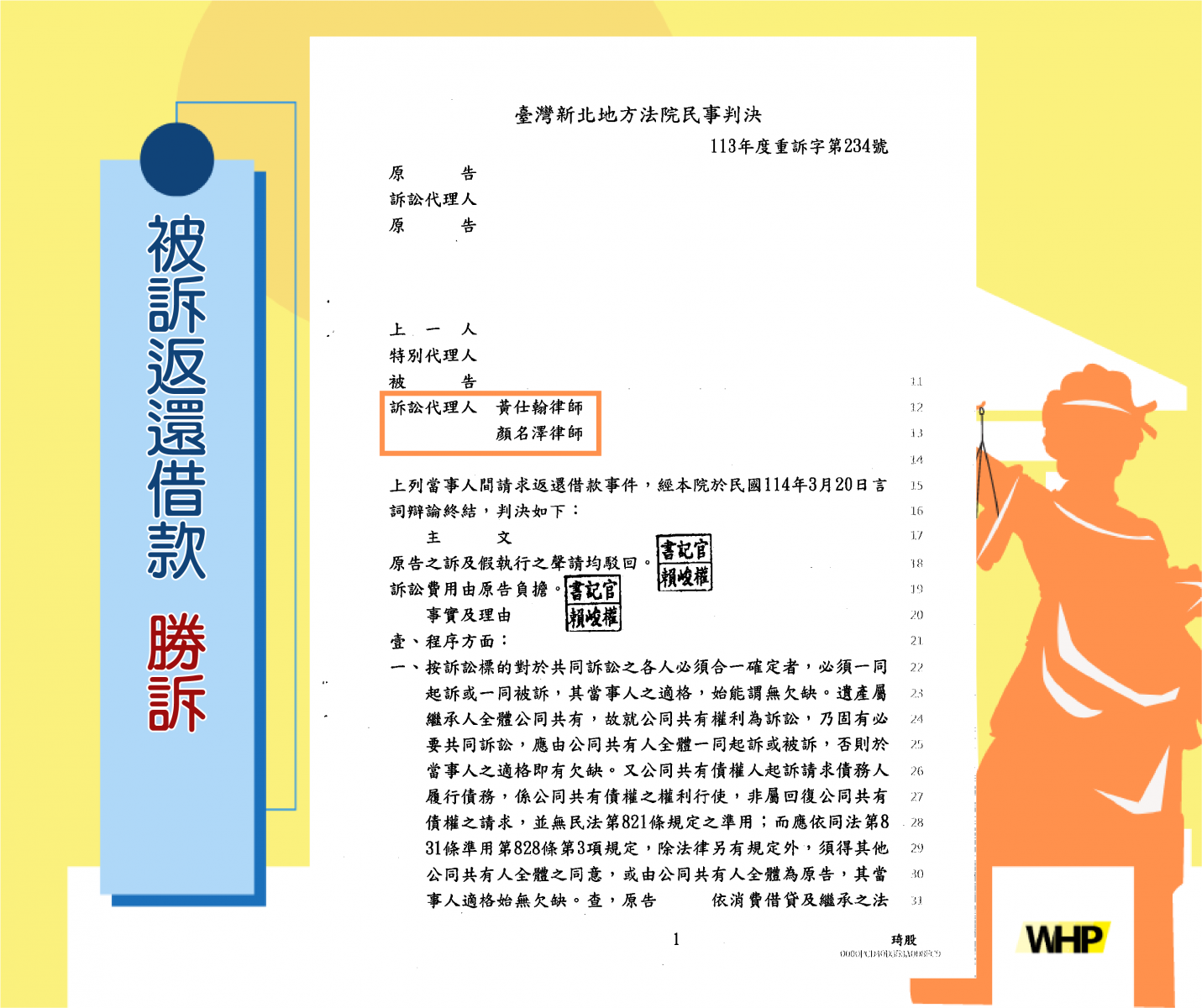首頁 >
| Civil | No evidence from the other party, still sued us for loan repayment

Relevant Provisions of the Case
Civil Procedure Act, Article 277:The party asserting facts that are favorable to them has the burden of proving those facts. However, this is not applicable if otherwise stipulated by law or if it would result in obvious unfairness given the circumstances.
Civil Code, Article 474:A loan for consumption refers to a contract in which one party transfers ownership of money or other replaceable items to the other party, with the agreement that the other party will return the same type, quality, and quantity of goods.
Facts and Reasons
The plaintiff, after the death of their father, developed an inheritance dispute with the defendant (the client of our law firm), claiming that the defendant had taken out a loan to purchase property during the father’s lifetime and had not repaid the loan after the father’s death. However, the plaintiff did not provide any written records such as a promissory note, loan agreement, or IOU to support this claim. The defendant, deeply troubled by these false accusations and the ongoing inheritance disputes, was unable to reach a consensus with the plaintiff and thus resorted to legal action.
Court Judgment
A party asserting facts favorable to them has the burden of proving those facts, as explicitly stated in the first part of Article 277 of the Civil Procedure Act. In civil litigation, if the plaintiff asserts a claim, the plaintiff must first bear the burden of proof. If the plaintiff fails to prove the facts they claim to be true, the defendant’s defense, even if they cannot provide evidence or if the evidence they present is flawed, should result in the rejection of the plaintiff’s claim.
In this case, the plaintiff claims that the defendant borrowed money from the father to purchase property, but the defendant denies this. As mentioned earlier, the plaintiff has the burden of proving the existence of an agreement between the defendant and the deceased regarding a consumption loan, as well as the fact that the deceased had transferred the loan amount to the defendant.
However, the plaintiff previously claimed in a guardianship application case involving the mother that the father had borrowed the name for registration purposes, as supported by the appeal in that case. The plaintiff's inconsistent statements about the reason for the loan in different cases make it impossible to establish that there was a mutual agreement for a consumption loan between the defendant and the deceased.
Additionally, the real estate sales contract and the transfer records provided by the plaintiff show that the funds were transferred more than a year before the property purchase, making it hard to believe that the defendant borrowed nearly 80% of the purchase price from the father over a year before buying the property. Furthermore, the bank did not retain the transaction records, making it impossible to prove into whose account the funds were transferred.
Therefore, the evidence presented by the plaintiff is insufficient to support the plaintiff's claim. The plaintiff's request is unfounded and should be dismissed.
(Note: To protect the client's interests, certain case details and judgment images have been redacted and modified. For a full review of the case, please refer to Judicial Yuan's judgment database)
Attorneys:Vincent Huang、Ian Yan
-
11.25 2025
Criminal | Forgery of Documents, etc. Successfully...
-
11.18 2025
Civil Case | Defendant’s Claim for Damages Success...
-
11.11 2025
Criminal | Violation of Anti-Money Laundering Act,...
-
10.28 2025
Criminal Case | Defendant Acquitted of Hit-and-Run...
-
10.21 2025
Criminal Case | Defendant Charged with Forgery Acq...
-
10.14 2025
Assisted in the Division of Co-owned Property and ...
-
09.30 2025
Defendant – Offenses Against Sexual Autonomy Appea...
-
09.23 2025
Criminal | Defendant Charged with Embezzlement in ...
-
09.16 2025
Criminal | Case of Infringement of Sexual Privacy ...
-
09.09 2025
Request for Ownership Transfer Registration – Plai...
-
09.02 2025
Civil | Joint Construction Dispute Requesting Perf...
-
08.26 2025
Criminal | Defendant Charged with Aggravated Fraud...
-
08.19 2025
Internal Company Dispute Defendant Forged Document...
-
08.12 2025
Civil Case | Check Dishonored – Claim for Loan Rep...
-
08.05 2025
Heavy Motorcycle Rear-End Collision, Lawsuit for N...